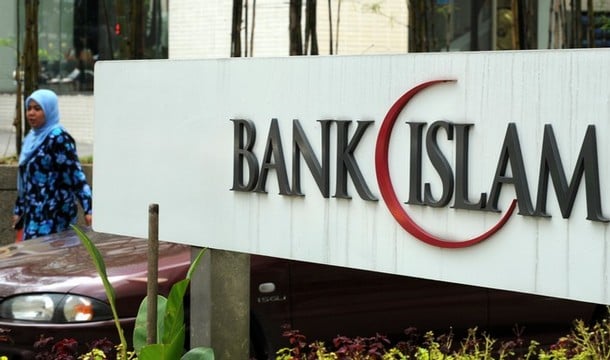
One of the branches of Bank Islam in Malaysia (founded in 1983).
Islamists look at their religion as a solution to all human problems, not only limited to the political sphere, but also as a provider of social justice and an engine of economic prosperity. In particular, they assert that Islam includes, among other things, the advantages of the values and institutions of “Islamic finance,” which refers to the provision of financial services in accordance with Shari’ah law.
A growing amount of global transactions is now being managed through Islamic finance. According to one study, “it is expected that the Islamic finance industry [encompassing banking, leasing, “Sukuk” (Islamic securities), equity markets, investment funds, “Takaful” (insurance) and micro finance] will more than double to US$2.6 trillion by 2017.” According to the State of the Global Islamic Finance Indicator 2015/2016 (developed and produced by Thomson Reuters), countries with the biggest Islamic banking market are Iran (with US$328.8 billion of assets), Saudi Arabia (US$300.3 billion) and Malaysia (US$174 billion).
Without paying much attention to the issue of causality in economic sciences (i.e. whether capitalism has to do with the inherent risk in banking; whether Islamic finance reduces income inequality; and so on), it seems the viewpoints of Islamic finance have created judgments ultimately as a sustained campaign to differentiate what Muslims considered the proper “Islamic” lifestyle from other lifestyles, without knowing that financial instability is inherent in all forms of banking, including Islamic banking.
Apparently, Professor Timur Kuran, belongs to a tiny group of serious economists who had studied “Islamic economics” with objectivity and an open mind. His book, Islam and Mammon, collects some of his major findings and arguments between 1989 and 1997. In his preface, Kuran argues that “looking back at the essays [grouped in the book], I am struck by how well they have stood the test of time.” He means that the clear theme unifying these essays is that “Islamic economics” is not a genuine answer to the world’s economic problems, but an “invented tradition” that serves as an adjunct to the broader, anti-Western, Islamist (and fundamentalist) political-religious movement.
The forbidding of interest is probably the most widely known and distinctive feature in “Islamic banking.” However, Kuran notes that “riba” originally referred to a practice of doubling a debt (and its accumulated interest) if it is not paid on time. Islamic banks, Kuran says, have moved to the use of financial instruments that resemble interest in all but name, while technically conforming to the requirement of not paying interest, such as briefly buying the assets of a borrower and then selling them back at a higher price.
All Islamic banks claim that their operations are free of interest and that their decisions rest on considerations that go beyond profit maximization. Kuran says that this point is not convincing because Islamic banks disguise the nature of their investment returns by characterizing them as “markups” or “service charges.”
When it comes to teaching Islamic finance at several institutions, Kuran thinks the proper place for training practitioners of Islamic finance is divinity schools, where beliefs may be treated as sacred and left unquestioned. Within academia, a master’s degree in “Islamic Finance” is not proper at all, as “how,” Kuran asks, “can such programs teach future bankers the tricks of disguising interest?” He further argues that “Islamic finance is a faith-based fabrication that sits awkwardly in a modern business school,” stating clearly “it will go down in history as a mighty deceit based on an operational principle that is simply unfeasible” (since, again, Islamic banks give and take interest under the guise of commissions, fees, penalties, or profit shares).
Claims of the significance and advantages of Islamic banking are indeed not compelling. Instead, they have contributed to the emergence of attacking the Western way of life, nurtured, of course, by the emergence of radical, militant Islam. This brings us to the early work of Prof. Kuran, which was actually on a very different topic: ‘preference falsification,’ which we find to be intense in closed Muslim societies.
It is basically the act of wanting one thing and saying that you want another, or having one ranking among options, but conveying another publicly. Just to be “polite,” for instance, Muslims may express admiration for Islamic banking, something they still do not find economically compelling or morally convincing. In response to social pressures, they perceive that if they do not express admiration for Islamic banking, they will be condemned. So they wind up praising Islamic banking because this appears to be a safe course of action, thinking that such acts would not result in societal harm.
On the contrary, such acts and beliefs have foreseen and unforeseen consequences: the economic activities undertaken in the name of Islam can provide financial support to fundamentalist political parties or organizations that seek to restrict social, economic, and cultural interactions between Muslims and non-Muslims. Thus, instead of emphasizing the common grounds of religions of the world, Islamic finance advocates are ironically dealing with the “uniqueness” of Islam which further conforms to Samuel Huntington’s “clash of civilizations.”